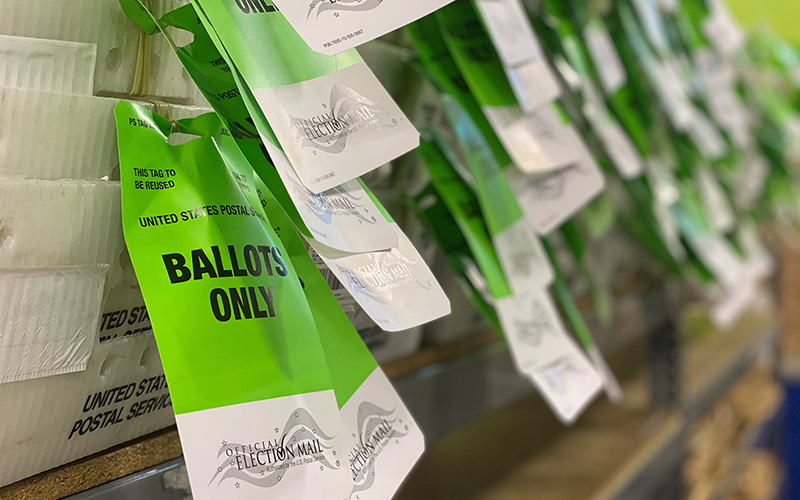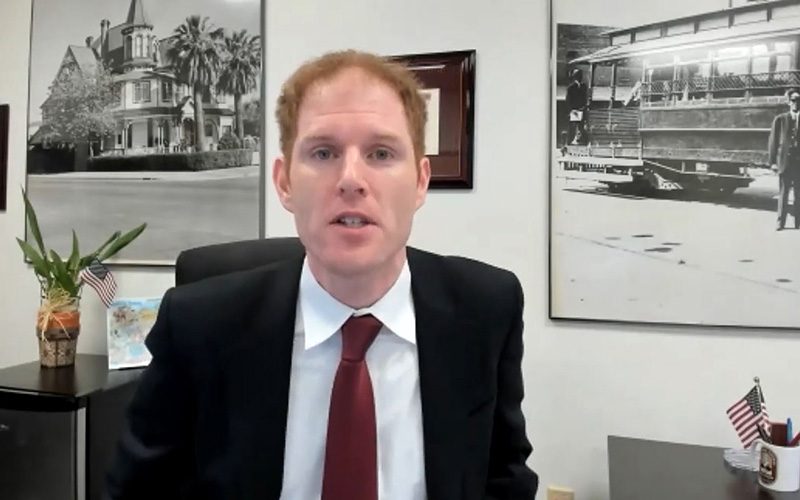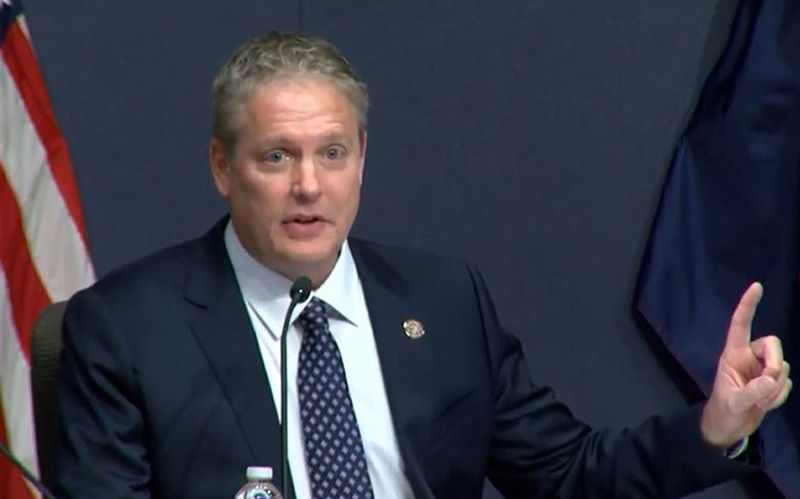
Arizona lawmakers are considering close to 100 election-related bills in this legislative session, including many that Democrats charge would attack the right to vote. But in a state where Republicans hold the governor’s office and majorities in both the House and Senate, stopping those bills is an uphill fight. (Photo courtesy Maricopa County Elections Department)
WASHINGTON – Arizona Democratic Party Chair Raquel Terán concedes that Democrats don’t have the numbers on their own to rebuff Republican election reform bills so she turned Thursday to an unlikely source for help: Republicans.
Terán, speaking on a panel of Democratic leaders from swing states, said it will likely take help from across the aisle to stop the most-extreme bills from passing in Arizona.
That may have happened already, with House Speaker Rusty Bowers on Tuesday referring the most-controversial election reform bill to 12 different House committees for review, a move seen by many as a way to bleed the bill to death.
“That bill is as dead as it can get at this moment,” said Rep. Jennifer Longdon, D-Phoenix. “And generally we don’t say that.”
But that does not mean Democrats are out of the woods: The National Conference of State Legislatures said that of 994 election-related bills filed in state capitals this year, 99 are in Arizona, or 10% of all such bills in the U.S. currently.
“Republicans in our state legislature have been active in putting forward bills that will make it harder for people to vote,” Terán said during the discussion Thursday with Democratic leaders from Wisconsin and Michigan. The call was organized for Democrats to discuss ways they can combat GOP efforts to restrict voting rights in their battleground states.
Terán said that Democrats in Arizona face the trifecta of GOP control of the governor’s office and both chambers of the Legislature. That has forced them to go on “complete defense.”
“We are two seats away from majorities in the House, two seats away from majorities in the Senate,” said Terán, who is also a state senator from Glendale. “So we always just need one Republican to block legislation.”
Getting Republicans to cross the aisle is “an uphill climb,” said Bob Grossfeld, a political and public affairs strategist at Politicare. But it’s not unheard of.
Besides Bowers’ move this week to hobble HB 2596, virtually every expert asked about the possibility of Republicans aiding Democrats pointed to Sen. Paul Boyer, R-Glendale.
Boyer last year bucked his party to oppose SB 1069, which would have removed voters from the Permanent Early Voting List if they had not voted early in the preceding two election cycles. He later supported a slightly modified version of that bill that became law.
Boyer also refused to join other GOP senators last year when they tried to hold Maricopa County supervisors in contempt as part of the partisan audit of county results from the 2020 presidential and Senate elections.
But while Boyer has been “a voice that has sided with the Democrats from time to time,” that does not mean they can count on him – or other Republicans – to join them if they don’t compromise as well, said Jason Rose, a Republican political consultant in Arizona.
He said there is a need for some electoral reform, but charged that Democrats have dug in their heels to gain an electoral advantage.
“The problem for the Democrats is they have developed a good sound bite and it’s voting rights,” said Rose. But he said some Republicans have responded “sometimes fairly, sometimes unfairly” with legislation that protects their own base of voters.
He said it will take “the sobriety of people that have been around the block that can forge great compromise” to move effective voting legislation.
“But until the personalities that often drive politics can emerge from the noise, you’re going to continue to have this paralyzing partisan pandering taking place,” Rose said.
Bowers this week appeared to target one of the most-extreme GOP election bills, HB 2596. It would eliminate early and mail-in voting, limit the number of polling centers to 1,500, require hand-counting of all ballots and give the Legislature the power to overturn election results. The bill even prohibits county officials from making people wear masks at polling places.
While that language may appeal to a certain set of Republican voters, it would likely anger most Arizona voters, “especially considering upwards of 80% or more … vote by early ballot,” said Paul Bentz, chief pollster at HighGround Inc.
Bentz said Bower’s move with HB 2596 showed “that there is even Republicans who recognize that some of the proposals are not having merit and should not be really considered in any serious way.”
But HB 2596 is just one of scores of what one advocate calls “democracy-undermining bills” in the Legislature this year.
“It’s not just that one bill, the provisions that are in that bill are broken up into a bunch of other bills,” said Alex Gulotta, Arizona director of the group All Voting is Local.
“We have real concern, because there are extreme anti-democratic policies that are being pushed by a whole host of legislators that basically undermine our freedom to vote,” Gulotta said.
Grossfeld said Democrats should “not hold out a whole lot of hope for a Republican assist” in the Legislature. He said they would be better served by focusing on ballot initiatives and voter referendums “to stop the worst of the worst.”
The Arizona Democratic Party two weeks ago endorsed a proposed initiative that Terán said prevents “the Legislature from overturning future presidential elections … establishes both the same-day and automatic voter registration, restores the popular Permanent Early Voting List and expands voting access to Arizonans with disabilities.”
While Democrats look for help from the other side of the aisle, Longdon said it shouldn’t be a partisan issue.
“What we’re really talking about here is protecting democracy and that shouldn’t be a Democratic value or a Republican value,” Longdon said. “An accurate, secure and accessible election should be the goal of every legislator in this body.”
– Cronkite News reporter Alexia Stanbridge contributed to this report.



